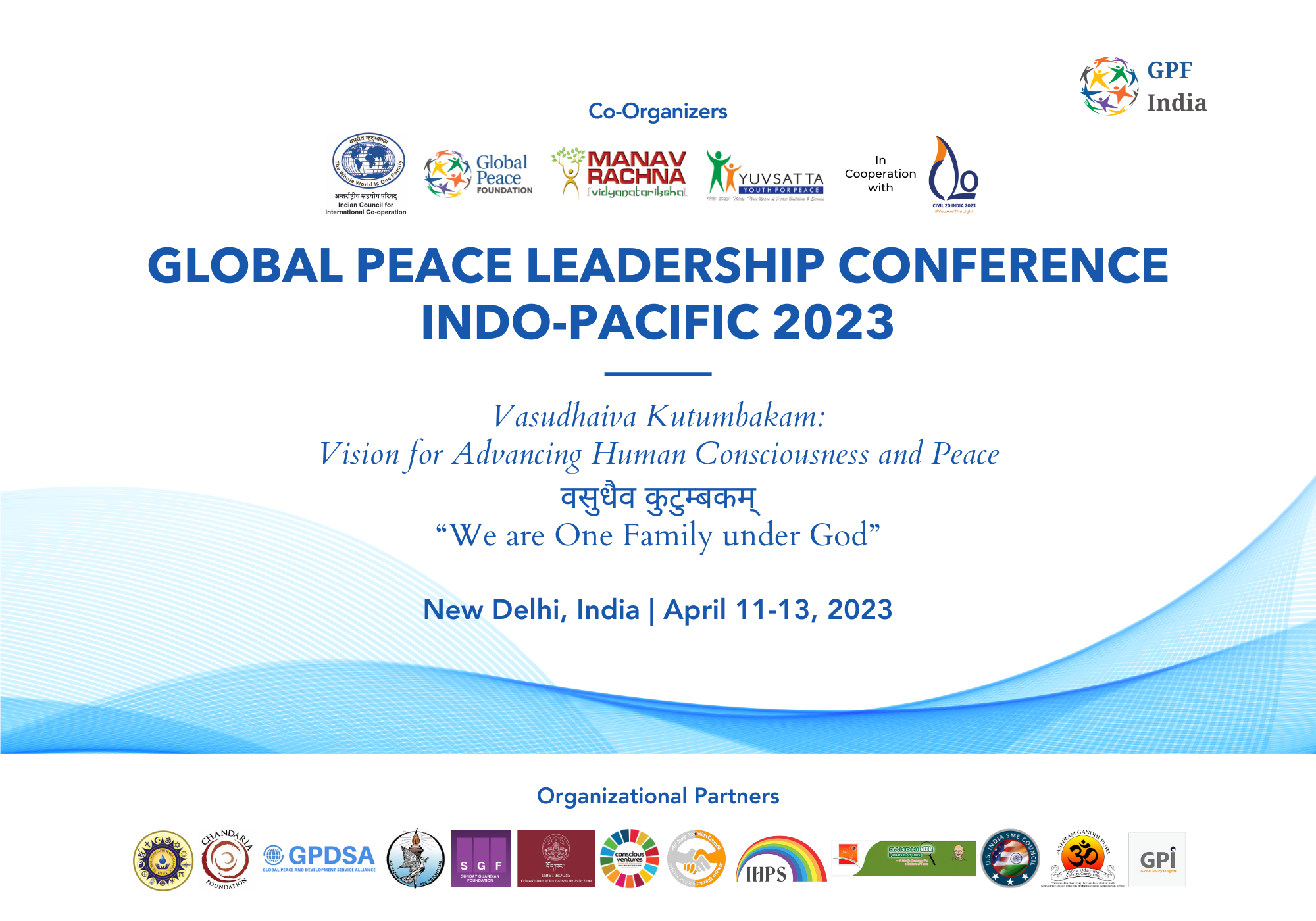

India’s rich and varied spiritual heritage has profoundly influenced human civilization. Among the great treasures of the Indian tradition is Vasudhaiva Kutumbakam, the maxim that the world is one family. It expresses a simple yet essential truth about our shared human identity that provides a compelling basis for global cooperation in resolving conflicts, building peace, and advancing the well-being of all. Given India’s unique heritage and key leadership role in the region and world, it offers a most fitting context to examine the civilizational implications of universal principles and their practical applications for peacebuilding. Thus, co-organizers and partners are organizing the Global Peace Leadership Conference Indo-Pacific (GPLC) in New Delhi, India on April 11-13, 2023, with the theme “Vasudhaiva Kutumbakam: Vision for Advancing Human Consciousness and Peace.”
 09:00 - 11:00
09:00 - 11:00 10:30 – 12:00
10:30 – 12:00 12:00 - 13:00
12:00 - 13:00 13:00 - 16:00
13:00 - 16:00 16:00 - 17:00
16:00 - 17:00 09:00 – 10:00
09:00 – 10:00 10:00 – 10:30
10:00 – 10:30 10:30 – 12:15
10:30 – 12:15Youth Empowerment: Leveraging the Youth as Global, Moral and Innovative Leaders of the Now
Transforming Education for the Future: The Need to Transform Education for the Future
Values-Based Peacebuilding: Our Common Humanity: Building Social Cohesion Through Shared Values
Environmental Conservation I: Environmental Threats, Impacts, and a Call to Action
 12:30 – 13:30
12:30 – 13:30 13:45 – 14:45
13:45 – 14:45Youth Empowerment: Youth Capacity Building and Empowerment through Literacy and Training on Essential Life Skills
Transforming Education for the Future: Realizing Future-Ready Education
Values-Based Peacebuilding: Living as One Human Family: Effective Methods and Lessons Learned from the Field
Environmental Conservation II: Environmental Models for Scalable Action Achieving 2030 Goals
 15:00 – 15:15
15:00 – 15:15 15:30 – 16:30
15:30 – 16:30Youth Empowerment & Values-Based Peacebuilding: Let’s All be Peacebuilders!
Transforming Education for the Future: Building Educator Capacity with Moral and Innovative Leadership
Environmental Conservation III: Session Inputs for New Delhi Declaration and C-20 Action on the SDGs
 16:30 – 17:30
16:30 – 17:30 10:00 – 11:00
10:00 – 11:00 11:00 – 11:15
11:00 – 11:15 11:30 – 13:00
11:30 – 13:00 13:00 – 14:30
13:00 – 14:30 14:30 – 16:30
14:30 – 16:30 16:30
16:30Youth are the greatest asset to any nation for sustainable development and peace. This session highlights tools with values-based strategies of youth empowerment and peacebuilding as well as best practices from throughout India and the Indo-Pacific region. Leveraging youth capacity building on leadership, peacebuilding, and new essential life skills will greatly contribute to the nation’s economic growth, peace and development. The Youth Track aims to improve youths’ approach to problem solve, to think from a global perspective, and to become moral and innovative leaders - rethink, redefine, and transform.
Sessions:
Transforming education is a process of refocusing learning priorities toward developing the character competencies and future workforce skills that are in high demand by employers, and toward preparing students to make a positive impact on their world. Students learn digital technologies, explore entrepreneurial enterprises, develop real-world problem-solving skills, and build core values of leadership and integrity. In this track, thought leaders will explore new trends, ideas, policies, and innovations underway to prepare students to be successful in all aspects of their lives and to contribute to the creation of flourishing societies and peace.
Sessions:
The ethos expressed in “Vasudhaiva Kutumbakam,” the vision of the one human family, offers a compelling foundation for peacebuilding. The world’s faith and wisdom traditions agree on universally recognized principles, shared values and time-honored truths about the intrinsic value, dignity, and fundamental rights of all people which are essential for ethical and cohesive societies. The Peacebuilding Track will examine effective models, best practices and practical tools for applying these ideals in educational programs, youth leadership development and community-based peacebuilding.
Sessions:
Critical environmental impacts of dramatic human population growth and rapid development clearly are significant factors affecting peace and security, often leading to food insecurity, large scale human migration and related issues. Environmental threats are also worsening, given that many conflict zones are also areas of great biodiversity. Creative, collaborative efforts are needed on every level to reduce environmental degradation and build sustainable practices to protect the earth as the essential home for the human family. This track will examine best practices and promote action on environmental stewardship and conservation, building on the good record of programs including Ganga/watershed preservation, Swachh Bharat Mission, recycling and solid waste innovation, mass tree planting and the Blue Economy furthering UN Sustainable Development Goals on the environment and peace.
Sessions: